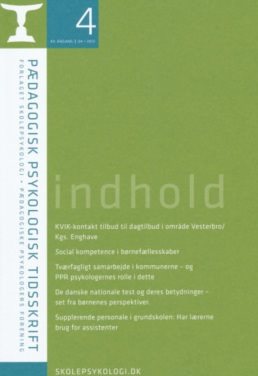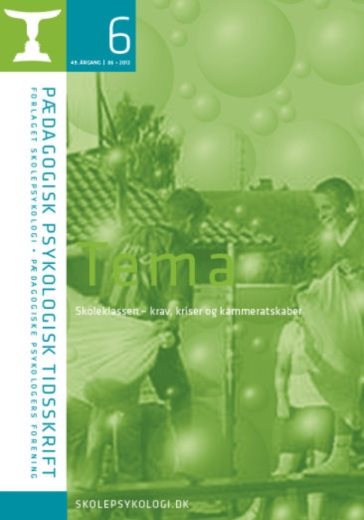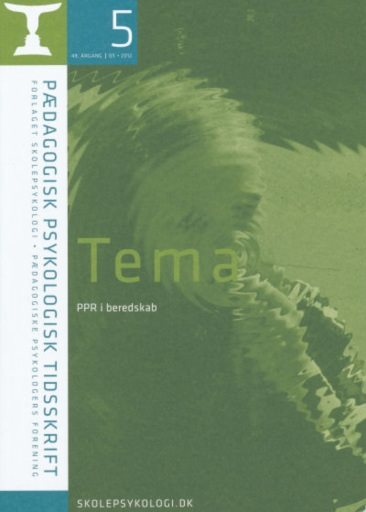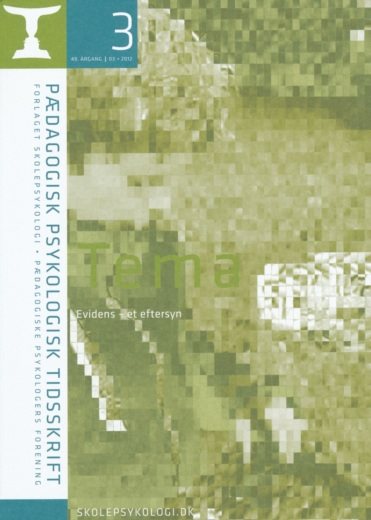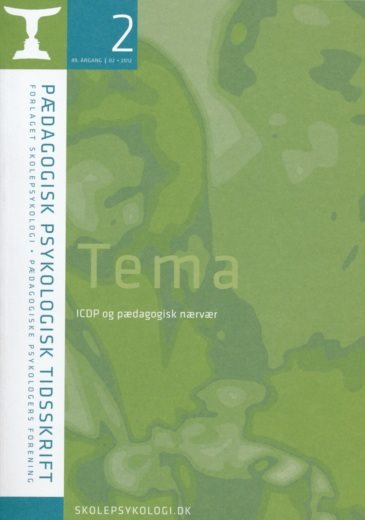Beskrivelse
Landholdt, Dorthe & Jungersen, Kirsten (Psychologist & chief school psychologist in Copenhagen). The Quick Contact- A School Psychological Offer. Pædago gisk Psykologisk Tidsskrift, 2012, Vol.45, 4, 229-239.- The Quick Contact has been developed in a part of Copenhagen. It serves children from O -17 in day care insti tutions. Its main goal is to support children, parents, and teachers in locked situa tions. The effort is interdisciplinary, the staffbeing support teachers, a nurse, a speech therapist, and a psychologist. While no formal evidence has been collected so far, very positive results are being reported.- Bjørn Glæsel
Goul-Jensen, Anne & Levring:Sørensen, Line (The Schoolpsychological Offi.ce of Vesthimmerland). Social Competence in Children’s Conununities. Pædagogisk Psykologisk Tidsskrift, 2012, Vol.45, 4, 240-252
This article ariginates from our thesis developed at Aalborg University in August 2010 (Goul- Jensen & Sørensen, 2010). Through observations carried out in a kin dergarten, we have explored how social competence can be understood within the setting of children’s communities. In the article we present selected themes from the thesis and introduce a model that sums up themost central results. Themodel contains individual and social factors as well as important balances that may con stitute social competence. It is our expectation that the model can be used as an analytical tool to achieve a more nuanced understanding of 3-6-year-olds’ social competence. The main condusion of the artide is that social competence is situated competence that eannot fully be understood by focusing on individual abilities. Therefore we findit important to payattention to the social and cultural context within the setting of children’s communities. -Anne Goul-Jensen & Line Løvring Sørensen.
Knudsen, Anne (privatpraktiserende psykolog) Interdisciplinary Operation between the Municipal Governments- The Role ofthe PPR Psycholo gists. Pædagogisk Psykologisk Tidsskrift, 2012, Vol.45, 4, 253-272
During the last decade the field of PPR has experienced an increased focus on de velopment of consultative models and methods. These have been founded either on the theory of systems or on social constructivism. These theories of learning and knowledge are concerned with the relation between the individual and is sur roundings but they don’t offer a frame for comprebension and interpretation which can give the psychologists a deeper understanding ofthe organizations they work in. Neither do they provide a deeper understanding ofthe adults they are working with, the children they arehelping or ofthemselves and the interaction and relations in which they are engaging. The consultative models and methods must be sup plied by a psychodynamic theory of organizations which can provide the psycholo gists in PPR with knowledge and a language which will enable them to observe and talk about the unconscious and invisible forces which always are present in and between humans and in organizations. When such a language doesn’t exist a lot of important elements aren’t pieked up and therefore not used creatively and con structive to identify and create new lines of action. Actually the opposite often happens.
This article is an attempt to provide some ofthe knowledge about organizations and groups which the psychologists in PPR henceforward can draw a benefi.t from by acquiring it as a part oftheir knowledge and lines of action. Ifthe inelusion pro ject is to succeed the interdisciplinary co-operation have to function. The whole fun dament in the municipal systems is the many groups/teams and the co-operation between them. But there aren’t any in this system with the special knowledge about groups and group dynamic processes. PPR must accept this challenge: Let the psychologist in PPR become the experts in municipal co-operation and interdisciplinary methods. Not on the expense ofbut in a constructive and creative dialog and with focus on a continuous development of consultative models and methods. The strength of the psychodynamic theory is its ability to put a language on all the unconscious processes and dynamic forces which arepresent in all organizations at all times in a challenging and exciting way. -Anne Knudsen
Kousholt, Kristine (Post.doc. at The University of Aarhus). The DanishNation al Tests and their Significance – Seen from the Perspective of the Chil dren. Pædagogisk psykologisk Tidsskrift, 2012, Vol.45, 4, 273- 290. This article presents a review ofrecent international research (2000-2011) on bullying in schools. By way ofintroduction the need for a more nuanced knowledge about bul lying is justified. The included research is discussed withadifferentiation between firstand second order perspectives on bullying. The aim is both to present impor tant knowledge about bullying and to explicity discuss different understandings of bullying, which is often implicitly present in research articles. This article thereby contributes to new knowledge when results ofresearch projects are being juxtapo sed. lt is argued that there are advantages to a second order perspective on bully ing and on interventions against bullying. -Kristine Kousholt
Rasch-Christiansen, Andreas (Head of Research at VIA UC). Assistents in Pri mary Schools. Can Practice and Cooperation with Teaching Assistents Benetit Well-being and Learning? Pædagogisk Psykologisk Tidsskrift, 2012, Vol.45, 4, 291-305.- Danish national research and fmdings from Finland deal with teaching assistents: why are they used? What are their functions? How do staff, pupils and parents evaluate their efforts? The data were obtained by large questionnaires, casestudies, observations etc. The evaluation is quite positive, but the development should be followed closely.- Bjørn Glæsel
